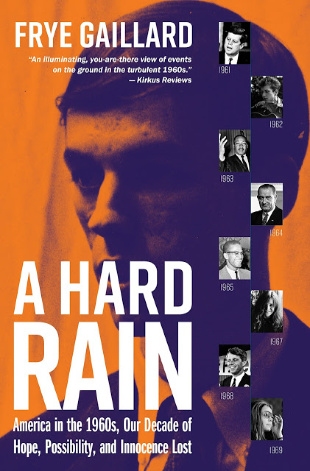"Lawson was black, a thirty-one-year-old activist from Ohio who had served a year in prison for refusing to fight in the Korean War. Upon his release, he became a missionary to India, where he immersed himself in Mohandas Gandhi’s theories of nonviolence. In 1957, after returning to the United States, he met and befriended Dr. Martin Luther King, a man he already admired from a distance. He remembered Gandhi’s prophecy that perhaps one day a black man from America would take up the cause of nonviolence and push it to heights more impressive than the Mahatma himself had achieved.
"Lawson thought King might be that man. The admiration between them was mutual. King had never met anybody like Lawson, with such a tightly woven understanding of the philosophy of Gandhi and the gospel of Jesus. King immediately urged his Methodist friend to move to the South and impart his knowledge to the civil rights movement. Lawson agreed. He moved to Nashville and in the fall of 1958 began holding workshops at Kelly Miller Smith’s First Baptist Church. It was a venerated institution, the oldest black church in Nashville, with roots going back to the 1830s. Frederick Douglas had spoken there, and later Martin Luther King, but no one had the impact that James Lawson did as the 1950s drew to a close. He was teaching, in effect, a Christian adaptation of Gandhi, the radical pursuit of brotherhood and justice that would soon become the animating force of the sit-ins.
"In Lawson’s understanding, this was not a tactic, but a way of living rooted in the notion of redemptive suffering. For some it was counterintuitive, this idea that pain can open the heart to compassion, and that a heart without malice can transform other hearts, turning enemies into friends. In Lawson’s hands, the sheer magnitude of the idealism was mesmerizing for many of the students, tied as it was to the notion of freedom, and they left the meetings with their heads in a spin.
" 'There was something of a mystic about him,' remembered John Lewis, a farm boy from South Alabama who had come to Nashville to study theology, 'something holy about his manner. . . . .'
"Lawson told them they were about to start a war. But only one side would fight with violence. Theirs would not. They would accept the blows that might rain down when they challenged the laws of racial segregation. But self-discipline and tolerance would not be enough — they must also love the people who abused them, must see and respect the humanity of their attackers, who were also victims, in their own ways, of the hate-filled system in which they lived. If that system were ever to change, Lawson declared, the means employed to bring about that change must be consistent with the ends they were seeking to attain. And so it was not enough simply to resist the urge to hit back. 'The urge can’t be there,' Lawson said. 'you have to have no desire to hit back.' "
